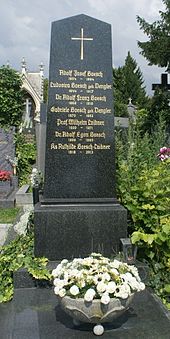Ruthilde Boesch
Ruthilde Boesch | |
|---|---|
| Born | Ruthilde Klösterer 9 January 1918 Braunau am Inn, Austria |
| Died | 20 January 2012 (aged 94) Vienna, Austria |
| Education | Wiener Musikakademie |
| Occupation |
|
| Organizations | |
| Awards | |
Ruthilde Boesch, born Ruthilde Klösterer, married also Ruthilde Loibner (9 January 1918 – 20 January 2012) was an Austrian soprano in opera, operetta, song and concert, and a vocal pedagogue. She was a member of the Vienna State Opera for decades, and later an influential voice teacher.[1]
Life and career
[edit]Born in Braunau am Inn,[2] Klösterer grew up in Mödling. After her school years she studied singing at the Wiener Musikakademie with Fritzi Lahr-Goldschmied, Alfred Jerger and Judith Hellwig, among others. She studied further with Helene Wildbrunn at the Meisterklasse of the Akademie from 1936 to 1938,[2] and an intensive role study with the Mozart conductor Josef Krips.[1]
From 1945 to 1971 the soprano's "main importance was to be found in the field of coloratura soubrette".[3] She was a member of the Vienna State Opera from 1947, where she made her debut as Susanna in Le nozze di Figaro.[3] She took part in 387 performances in 38 different roles,[1][4] appearing in more Mozart roles, such as Papagena in Die Zauberflöte, Blondchen in Die Entführung aus dem Serail, Despina in Così fan tutte, among other.[4] She also appeared as Chloe in Pique Dame, Olympia in Offenbach's Les contes d'Hoffmann, Zerbinetta in Ariadne auf Naxos by Richard Strauss, and Luciete in I quatro rusteghi, among others.[1][4] In 1949 she sang the Second Boy in Die Zauberflöte at the Salzburg Festival under Wilhelm Furtwängler, and the same year Blondchen at the Bregenz Festival.[1][3]
Boesch appeared on many stages of the world. Numerous concerts and guest performances took her to Europe, the U.S., the Middle East, Australia, South and North America.[1] She made five world tours of recitals with her second husband, the State Opera conductor Wilhelm Loibner, who was her accompanist.[1][3] In 1968, she was awarded the title Kammersängerin.[2]
After her retirement from the stage in 1974, she lived for a while in Japan.[1] She devoted herself to teaching. Her pupils included Edita Gruberová, Eva Lind, Genia Kühmeier, her son Christian Boesch and her grandson Florian Boesch.[2]
From her first marriage to A. E. Boesch, Ruthilde Boesch had two sons, Wolfgang Boesch (born 1939), a writer, and Christian Boesch who became a singer.[1]

She died in Vienna[2] and is buried at the Grinzinger Friedhof (group 6, row 4, no. 4) in Döbling.[5][6]
Awards
[edit]- Austrian Kammersängerin (1968)[2]
- Ehrenring of the Vienna State Opera[2]
- Austrian Decoration for Science and Art in Silver[2]
Recordings
[edit]Her recordings are held by the German National Library, including:[7]
- Die Zauberflöte
- Der Ring des Polykrates
- Rusalka
- Eine Nacht in Venedig
- Die Fledermaus
- Echo eines Sangeslebens (CD for her 80th birthday)
References
[edit]- ^ a b c d e f g h i "Ruthilde Boesch". The Telegraph. London. 3 April 2012. Retrieved 2 February 2019.
- ^ a b c d e f g h Boisits, Barbara; Demcisin, Georg (2002). "Boesch, Familie". Oesterreichisches Musiklexikon (in German). Vienna: Verlag der Österreichischen Akademie der Wissenschaften. ISBN 3-7001-3077-5.
- ^ a b c d Kutsch, K.-J.; Riemens, Leo (2012). "Boesch, Ruthilde". Großes Sängerlexikon (in German) (4 ed.). Walter de Gruyter. p. 470. ISBN 978-3-59-844088-5.
- ^ a b c "Ruthilde Boesch" (in German). Vienna State Opera. Retrieved 9 February 2019.
- ^ Kral, Harald (24 January 2012). "Sängerin Ruthilde Boesch gestorben". Tamino Klassikforum. Retrieved 7 March 2019.
- ^ Alessandro Cipriano (22 January 2012). "In Memoriam KS Ruthilde Boesch ( 9. Januar 1918 in Braunau am Inn, † 20. Januar 2012 in Wien)" (in German). Show Biz Talk Online. Retrieved 7 March 2018.
- ^ "Recordings by Ruthilde Boesch" (in German). German National Library. Retrieved 9 February 2019.
External links
[edit]- Ruthilde Boesch discography at Discogs
- KS Ruthilde Boesch – Echo eines Sängerlebens auf members.inode.at
- KS Ruthilde Boesch†, Ehrenmitglied EVTA-Austria
- Echo eines Sängerlebens: Ruthilde Boesch von Mozart bis zum Walzerlied
- Recordings on IDAGIO
- 1918 births
- 2012 deaths
- People from Braunau am Inn
- Austrian operatic sopranos
- Österreichischer Kammersänger
- Austrian voice teachers
- People from Mödling
- Musicians from Lower Austria
- 20th-century Austrian women opera singers
- Recipients of the Austrian Decoration for Science and Art
- University of Music and Performing Arts Vienna alumni
